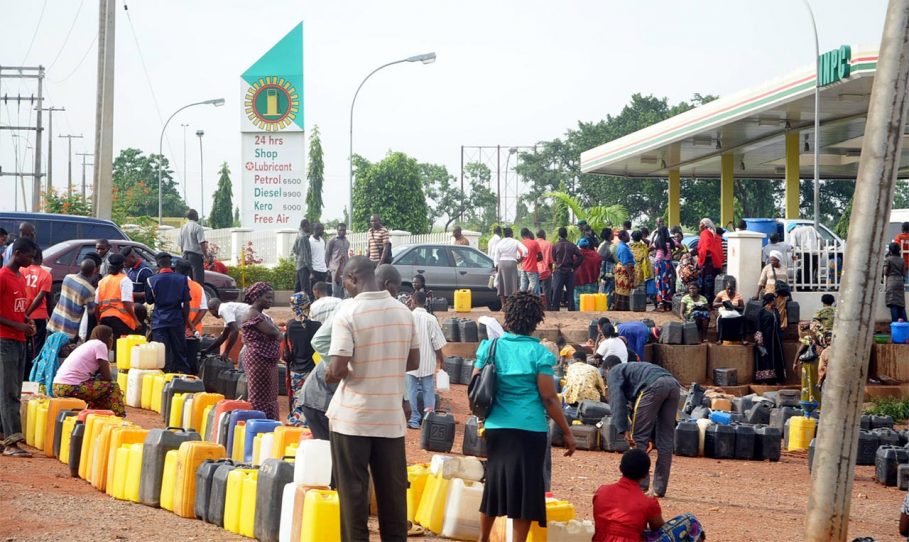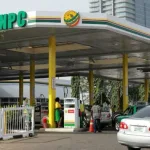As Nigerians grapple with scarcity and high price of fuel, it has been emphasised that only a fully deregulated market with perfect competition, would facilitate increased supply, and make the commodity stable and affordable in the country.
With four major government-owned refineries and being one of the largest crude oil producers in Africa, Nigeria has not been able to produce refined petroleum products for decades, making the country to rely heavily on importation to meet local demands, with the Nigeria National Petroleum Company Limited (NNPCL) being the sole importer. Disruption in supply has led to intermittent fuel scarcity and high cost of the commodity across the country.
Join our WhatsApp ChannelThe removal of subsidy on petrol last year led to a significant hike in the price of the commodity, which consequently affected the cost of other things, including transport and logistics, and energy costs for businesses. This pushed the country’s inflation rate to a 28-year high of 34.19 per cent in June before decelerating to 33.40 per cent in July 2024.
Experts have projected that inflation is now on a downward trajectory but expressed worry that it could be affected by further hike in prices of petroleum products in Nigeria.
The subsidy removal meant that the price of petrol in the country would now be affected by the dynamics of oil prices in the international market and foreign exchange market.
With the steep depreciation of the naira, following the FX market reforms last year, there were indications by analysts that the price of petrol could go beyond N1,000 per litre. Some reports thereafter emerged, pointing to the fact that the Federal Government through the NNPC has returned subsidies through the back door, but that was denied.
READ ALSO: Petrol Price To Hit N1,300, NNPC Faces Financial Strain
Subsequent reports revealed that the national oil company is now indebted to international supplier of petrol to the tune of about $6 billion, making the traders to halt supply, which has contributed significantly to shortage of supply to local marketers.
After initially denying the claims, NNPCL last weekend admitted that it has financial strain and that its outstanding debts to suppliers have been a major factor behind the ongoing fuel scarcity across the country.
“NNPC Ltd. has acknowledged recent reports in national newspapers regarding the company’s significant debt to petrol suppliers. This financial strain has placed considerable pressure on the Company and poses a threat to the sustainability of fuel supply.
“In line with the Petroleum Industry Act (PIA), NNPC Ltd. remains dedicated to its role as the supplier of last resort, ensuring national energy security. We are actively collaborating with relevant government agencies and other stakeholders to maintain a consistent supply of petroleum products nationwide,” part of a statement released by NNPC spokesperson, Olufemi Soneye read.
The 650,000 barrels per day Dangote Refinery, which commenced operations in January this year, had faced hurdles related to supply of crude oil to the facility by local producers, and other regulatory hitches that were alleged to be efforts by oil cabals benefiting from the current petrol import regime that is ripping off on Nigeria’s economy to frustrate the company.
Mixed Feelings Over Price Hike As Dangote Petrol Set To Hit Market
The announcement by President of Dangote Group, Aliko Dangote on Tuesday, that the Refinery is now ready to supply petrol to Nigerian market has been received with joy by many Nigerians who hope to see the end of scarcity and high cost of the product.
Dangote, who commended President Bola Tinubu for approving the crude oil sales in naira policy, said it would reduce pressure on FX by at least 40 per cent. He assured that the $20 billion facility is capable of supplying to not just Nigeria but other markets across Sub-Saharan Africa.
He also confirmed that NNPCL will be the sole distributor, adding that the company is ready to sell once they finalise arrangement with the national oil company.
However, Nigerians were at the same time bedeviled with the resurgence of scarcity and further hike in price of petrol across the country.
NNPCL increased pump price of petrol from N568 and N617 per litre to N855 and N897 depending on location. Our checks revealed that while some petrol stations in Lagos sell at N1,000 independent marketers sell at N1,200 and N1,300 per liter in some states including Enugu following the NNPCL’s upward review of its prices.
Though NNPCL has not officially made any statement about the petrol price increase, analysts have attributed the latest hike to the fact that the national oil company is having financial difficulties and is unable to continue bearing the extra cost for Nigerians to continue getting the product at about N600.
Independent Petrol Marketers Association of Nigeria (IPMNAN) has on different occasions lamented about non-supply of petrol directly to its members by NNPCL, forcing them to buy from private depots at higher price, hence the reason their prices are different from major marketers.
National Vice President of IPMAN, Hammed Fashola in a statement on Wednesday, revealed that NNPCL had barred its members from getting petrol at depots.
Currently, many filing stations are not dispensing in different parts of the country. While some allegedly closed to monitor the prices, others are said to have ran out of stock.

Transport Fare Hike Other Concerns
The situation has forced many motorists off the road, leaving many commuters stranded at bus stops. It has led to further increase in transport fares, forcing some Nigerians to resort to long-distance trekking, while others miss work due to the higher transportation costs.
Different groups including labour unions, National Association of Nigerian Students, Afenifere, Peoples Democratic Party (PDP), and the Nigeria Bar Association (NBA), have reacted to the latest development, calling on the Federal Government to reverse the petrol price hike.
Call for Perfect Market to Stabilise petrol price
While the fuel crisis lingers, there are renewed calls for the country to fully deregulate the entire petroleum price.
Executive vice president, NNPC (downstream), Adedapo Segun, has highlighted the need for creating a strong competitive market in the downstream petroleum sector and boosting liquidity in the foreign exchange (FX) market to stabilize prices of petroleum products in the country.
In an interview on Arise News TV Morning Show on Thursday, Segun, who noted that NNPC’s current price of N897 per litre is still being subsidised by government, called for adoption of a free-market pricing system for petrol.
According to him, section 205 of the Petroleum Industry Act (PIA) 2021 which gave birth to the current NNPCL, stipulates that fuel prices should be based on free market conditions.
READ ALSO: NNPCL’s $6.8 Billion Debt Crisis Sparks Calls for Urgent Privatisation
“It’s actually supposed to move in consonance with changes and market conditions. During the summer months, prices are high because it’s a driving season, in the winter months, prices come down and things like that. So, that’s what the PIA provides for, prices should move with the seasons,” Segun stated.
The NNPCL executive argued that allowing free-market condition for PMS pricing would engender healthy competition and stabilize prices.
“What’s sustainable is the unrestricted free market pricing of PMS. That way, competition takes over, and Nigerians will get the best,” Segun stated.
Segun’s submission corroborates the call by former Minister of Education, Dr Oby Ezekwesili in a recent interview that the government should completely deregulate the petroleum sector.
Dr Ezekwesili argued that merely removing subsidy is not sufficient to address the shortcomings in the petroleum sector.
She said the sector needs to be market-driven, which involves structural and governance changes in the roles and responsibilities of the government agencies in the sector.
The former minister, who is also an economic and governance policy expert, stated that the deregulation would mean that private investors would be allowed to come in while the NNPCL simply becomes a player instead of controlling many activities in the sector as it currently do. This, she insisted, would ensure efficiency when competition comes full circle. She cited the example of the reforms in the telecoms sector.
Other critiques have highlighted inefficiencies of government agencies in the petroleum sector and the impact on growth.
While congratulating Aliko Dangote for successfully finishing his refinery, billionaire investor, Femi Otedola recalled how he and Dangote made efforts to invest in Kaduna and Port Harcourt refineries but it was thwarted by the government of the day, and 25 years later, those facilities have remained moribund “despite billions of dollars spent on so-called turn-around maintenance.”
Last week Thursday, the NNPCL had announced that it wants to hand over operation of Kaduna and Warri refineries to reputable and capable Operation and Maintenance (O&M) companies to ensure sustainability of fuel supply in the country.
Reacting to that, former vice president, Atiku Abubakar, said it may still turn out to be like previous arrangements that did not work due to lack of transparency in the contract award process.
The former Vice President maintained that for such a deal to be successful, the Bureau of Public Enterprise (BPE) and a credible technical partner like Standard and Poor’s must be part of the process.
He said manage and operate arrangement has not been profitable.
“The manage and operate approach has not always worked. The Manitoba Hydro International, which was handed the Transmission Company of Nigeria led to nowhere. Similarly, Global Steel Limited, which was handed the Ajaokuta Steel Company, was not able to make the facility profitable.
“The contract was questionably revoked by the Umaru Musa Yar’Adua administration, and Nigeria ended up paying Global Steel a compensation of nearly $500m while Ajaokuta remains comatose 17 years later,” Atiku stated.
He called on Federal Government to list NNPCL on the stock exchange in line with the Petroleum Industry Act. According to him, “This would make the company more profitable and enhance transparency and corporate governance.”
“Currently, the NNPCL claims to be private, but this is only a ruse to fool the feeble-minded because it remains the ATM of the Federal Government. Anything short of listing the NNPCL on the stock exchange is nothing but a cosmetic development,” he added.
Victor Ezeja is a passionate journalist with seven years of experience writing on economy, politics and energy. He holds a Master's degree in Mass Communication.


















Follow Us